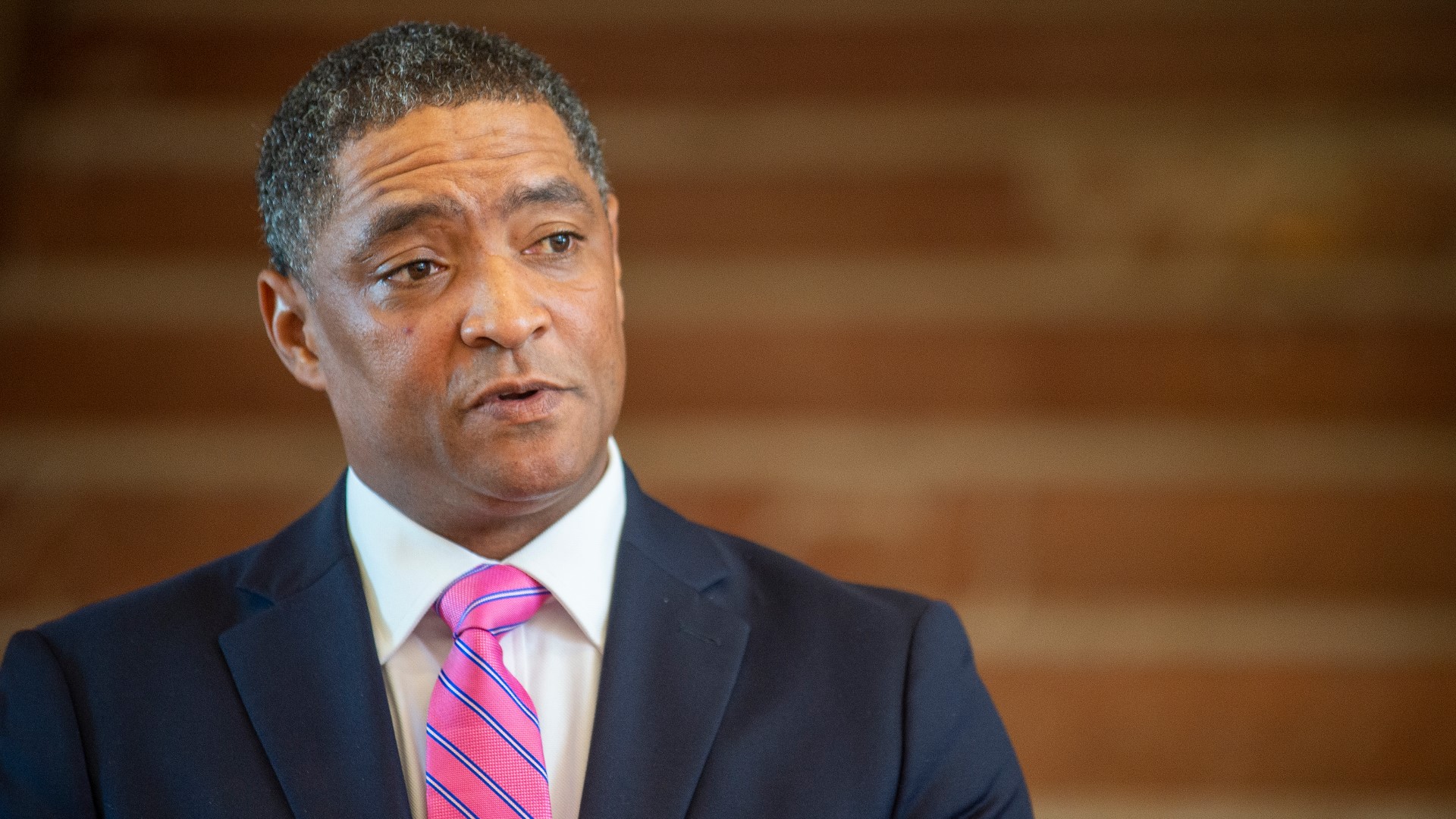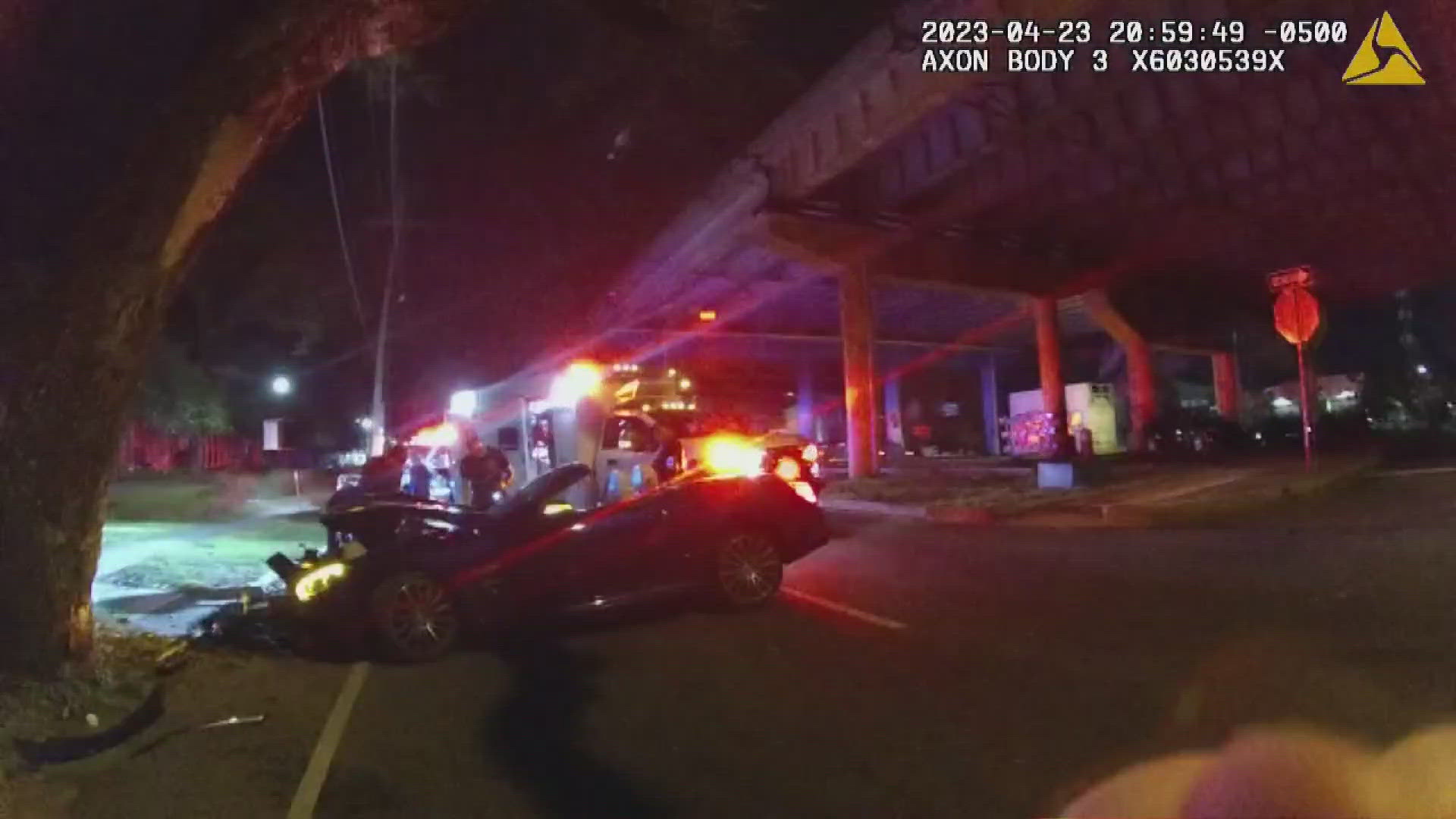Paramedic told police Cedric Richmond looked intoxicated after crash but no sobriety test given; report
A hearing at which a panel of NOPD brass will determine whether Miranda violated any departmental policy has yet to occur. Any disciplinary action would come after.

A New Orleans paramedic who treated former U.S. Rep. Cedric Richmond after Richmond crashed his Mercedes into a tree along North Claiborne Avenue last April told the responding police officer that Richmond appeared intoxicated, according to an internal report by the NOPD’s Public Integrity Bureau.
The Crash No DWI test given
The officer, Mark Miranda, like EMT Ryan Satterberg, noticed Richmond’s slurred speech and disorientation. But Miranda still opted against giving Richmond a sobriety test, or asking Richmond if he had been drinking, after consulting by phone with a ranking officer and noting Richmond’s importance.
That officer, Lt. Salvatore Caronna, told him to handle the incident “by the book,” according to the report.
In the end, the report concludes Miranda was correct in deciding he had no probable cause to test Richmond for DWI, despite the circumstances of the single-car wreck. The report suggests the decision was made in consultation with Caronna, based in part on Miranda’s assertion that he did not smell alcohol on Richmond and saw no empty bottles or other evidence of alcohol use.
Anthony Radosti, former vice president of the watchdog Metropolitan Crime Commission and a former NOPD officer, says he can’t understand why Richmond wasn’t questioned about alcohol use.
“Two questions should have been asked,” said Radosti, who reviewed the original report and the PIB investigation at the request of The Times-Picayune and WWL-TV. “The first question is where are you coming from, and where you're going? And the second question is how much have you had to drink today? It's not here.”
The NOPD has declined to answer questions about whether Caronna called any other police or city officials about the April 23 incident. Caronna did not return a message seeking comment. By departmental policy, officers are generally barred from talking to reporters without prior approval.
Internal Investigation No hearing yet
The report by Lt. Nicole Powell concludes the only error Miranda made in his investigation was in failing to take down the name and contact information of a witness.
Keith Sanchez, the deputy chief of PIB, signed off on the report on Oct. 29 under his own name and on behalf of Police Superintendent Anne Kirkpatrick, signaling that Kirkpatrick concurred with the findings. It’s unclear whether Kirkpatrick – who was sworn in as chief a month earlier and was still awaiting City Council confirmation in late October – read the report.
NOPD officials did not answer questions about why Sanchez signed for Kirkpatrick.
A hearing at which a panel of NOPD brass will determine whether Miranda violated any departmental policy has yet to occur. Any disciplinary action would come after that.
The internal affairs report was commissioned two days after the news organizations published a story in June 2023 questioning whether special treatment was afforded to Richmond, a former White House aide to President Joe Biden and a towering figure in local politics who now works for the Democratic National Committee.
Richmond totaled his Mercedes convertible after slamming into a tree off the right side of the roadway. Richmond’s 8-year-old son, a passenger, told police that the accident occurred after an orange Corvette cut them off, but no other vehicle appears in a video that captured the wreck.
Neither Richmond nor his attorney, Ike Spears, responded to requests for comment.
PIB Report
The report was released to The Times-Picayune on June 13, in response to a public records request submitted eight months earlier. The reason for the delay is unclear.
The document is heavily redacted. Every time Richmond or his son is mentioned, the name is redacted. Likewise, most references to Richmond’s possible inebriation are blacked out.
In some cases, the redactions are replaced with a stamp that reads “HIPPA,” a reference to the Health Insurance Portability and Accountability Act, which protects the privacy of some medical records.
Satterberg, the EMT on the scene, “told Officer Miranda the driver [HIPPA],” Powell’s report says at one point. At another point, it says that “the two medical professionals who attended [Richmond] the night of the traffic crash had conflicting medical observations as it relates to the evidence (smell) of alcohol” on Richmond’s breath.
Satterberg was terminated by the city for alleged misconduct a couple of months after the accident. He declined to speak about the Richmond incident, citing HIPAA. But he noted that police never asked him what he saw, despite setting up an initial interview.
According to the report, an EMS supervisor canceled the interview with Satterberg and directed questions to the City Attorney’s Office.
In several places, the report notes that Miranda says the “attending physician” who treated Richmond at University Medical Center did not smell alcohol on Richmond or otherwise suspect intoxication. But the report never names the doctor, who was not interviewed by the PIB, or for Miranda’s original report.
The report also indicates Powell gave up on talking to one of Satterberg’s former partners, Anthony Jones when she learned he left his city job.
City records show that both Jones and Satterberg faced discipline at the time they left city employment.
There’s no evidence in the report that Powell ever attempted to contact a third EMT who was at the scene, Eugene McMillen. McMillen did not return an email and a phone message seeking comment. Jones could not be reached.
Tim Lentz, the former chief of the Covington Police Department, who reviewed the reports at the request of the news organizations, faulted PIB investigators for not digging deeper.
“This all surrounds an individual who was possibly drunk when he crashed his car,” Lentz said. “Did a police officer conduct a thorough investigation? In my opinion, reading this internal affairs report – there were individuals that should have been spoken to that were not.
“At the end of the day, was he drunk or not? You gotta turn over every leaf... The internal affairs responsibility is to get to the truth of allegations made against police officers. I think in this particular case, NOPD could have done a better job finding out those facts.”
Miranda opted not to cite Richmond – even for failing to maintain control of his car – in part because he and Caronna decided that the child’s story about the Corvette could not be fully debunked, the report says.
NOPD DWI enforcement
The PIB report says that Miranda had investigated approximately 200 traffic accidents by the time of the wreck, but it notes that he was not “DWI certified.” NOPD officials did not respond to questions about how many officers possess such certification, or whether it’s necessary to be certified to conduct a DWI investigation.
Richmond’s crash came during a time when DWI enforcement at NOPD was dramatically down. Last year, New Orleans police cited 210 drivers for DWI, down almost 90% from a decade earlier. The pace has ticked up some this year.
Former NOPD Superintendent Ronal Serpas, now a professor of criminal justice at Loyola University, said the PIB report highlights “two of the key issues of the consent decree,” the agreement between the city and the U.S. Department of Justice requiring various police reforms at NOPD.
The federal monitors overseeing the decree have continually raised questions about whether the Public Integrity Bureau can competently investigate city police officers. They’ve also raised questions about whether NOPD brass can train lower-ranking officers to do their jobs well.
“Why didn’t the supervisor just go out there?” Serpas asked. “Maybe the monitors ought to take a look at it if they haven’t already.”
Lentz, the former Covington chief, agreed. “As a supervisor in today's world, especially when you have incidents like this, you need to be on the scene,” he said. “You need to get eyes on it and to see that it's being handled correctly. Not via cell phone.”
Just one of the four experts interviewed for this story – Bill Pelaranos, the author of the book “DUIs Decoded” – said he felt the PIB investigation was thorough and complete.
Serpas lamented that even if Miranda handled the incident correctly, the PIB report, because of all the questions it leaves unanswered, won’t exonerate him.
“What if this cop didn’t do anything wrong?” he asked. “This isn’t fair to him.
► Get breaking news from your neighborhood delivered directly to you by downloading the new FREE WWL-TV News app now in the IOS App Store or Google Play.


